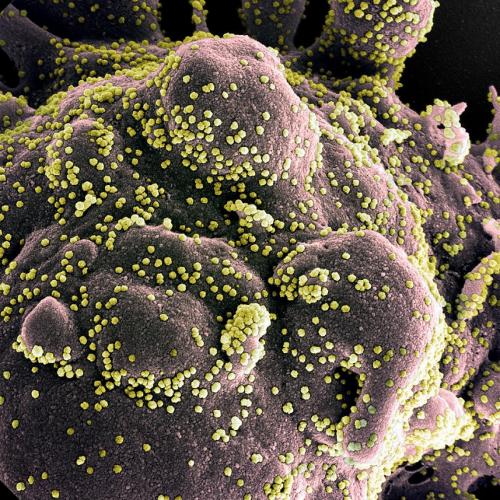Investigational COVID-19 vaccine well-tolerated and generates immune response in older adults
A Phase 1 trial of an investigational mRNA vaccine to prevent SARS-CoV-2 infection has shown that the vaccine is well-tolerated and generates a strong immune response in older adults. A report published on Sept. 29 describes the findings from the study.

Colorized scanning electron micrograph of an apoptotic cell (gray) heavily infected with SARS-COV-2 virus particles (yellow), isolated from a patient sample. NIAID
The experimental vaccine, mRNA-1273, was co-developed by researchers at NIAID and Moderna, Inc. of Cambridge, Massachusetts. The Phase 1 trial began on March 16, 2020, and was expanded to enroll older adults about one month later. Older adults are more vulnerable to complications of COVID-19 and are an important population for vaccination. Understanding how the vaccine affects older adults is a critical part of measuring its safety and efficacy.
In its expansion to include older adults, the trial enrolled 40 healthy volunteers: 20 adults ages 56 to 70 years, and 20 adults ages 71 years and older. Ten volunteers in each age group received a lower dose of the vaccine (25 µg), and 10 volunteers in each age group received a higher dose (100 µg). After approximately one month, volunteers then received a second dose of the same vaccine at the same dosage. Throughout the study, volunteers attended clinic visits to track their responses to the vaccine and assess safety.
Overall, the researchers found that the investigational vaccine was well-tolerated in this older age group. Although some volunteers experienced some transient adverse effects, including fever and fatigue after vaccination, the researchers found that they also exhibited a good immune response to the vaccine: the blood of vaccinated volunteers contained robust binding and neutralizing antibodies against SARS-CoV-2. Importantly, the immune response to the vaccine seen in older volunteers was comparable to that seen in younger age groups.
The study will continue to follow the older volunteers for approximately a year after second vaccination to monitor the long-term effects of the vaccine. According to the researchers, these Phase 1 trial results further support testing of the investigational vaccine in older adults in an ongoing large Phase 3 trial.
Source: U.S. National Institutes of Health
- 344 reads
Human Rights
Fostering a More Humane World: The 28th Eurasian Economic Summi

Conscience, Hope, and Action: Keys to Global Peace and Sustainability

Ringing FOWPAL’s Peace Bell for the World:Nobel Peace Prize Laureates’ Visions and Actions

Protecting the World’s Cultural Diversity for a Sustainable Future

Puppet Show I International Friendship Day 2020

